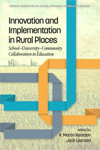
Innovation and Implementation in Rural Places
School-University-Community Collaboration in Education
Edited by:
R. Martin Reardon, East Carolina University
Jack Leonard, University of Massachusetts Boston (retired)
A volume in the series: Current Perspectives on School/University/Community Research. Editor(s): R. Martin Reardon, East Carolina University. Jack Leonard, University of Massachusetts Boston (retired).
Published 2018
This volume focuses on innovative school-university-community collaborations that are being implemented in rural places in the United States. A foundational belief that underpins the contributions to this volume is that rural communities contain within themselves the resources to promote and sustain vibrant educational endeavors. This belief has inspired a wealth of innovations that collectively offer a countervailing perspective to the view that global competitiveness is the preeminent goal of education, and that this goal is best served by “big education.” Since early last century, there has been a pervasive implicit, and sometimes explicit, assumption that rural places are bereft of the ability to educate children effectively. As repeatedly witnessed in this volume, in collaboration with universities, schools in rural places and the communities that both sustain and rely on them can appropriately configure the educational environment to optimally nurture the intellectual growth of children.
The chapters in this volume are grouped into three parts that explore, in turn, the design features of innovative school-universitycommunity collaborations, some novel approaches to such collaborations, and the contours of parental and community involvement in such collaborations. Chapters discuss both larger scale collaborations that involve many school districts across wide -spread regions, and smaller scale collaborations that involve intensive engagements among the educators and members of smaller communities, and offer theoretical insights into the collaborative process itself. As mentioned above, two narrative threads run through the chapters: that effective collaborations address goals and aspirations expressed by those who are privileged to live in rural America, and that effective collaborations are oriented to building on the strengths inherent in the social fabric of those rural communities.
CONTENTS
PART I: DESIGN FEATURES. Developing and Sustaining School–University–
Community Collaborative Partnerships to Develop School Leaders in Rural Areas, Bonnie C. Fusarelli, Lance D. Fusarelli, and Lesley G. Wirt. Germinating, Growing, and Renewing a District-University Partnership to Prepare Rural School Leaders, Kimberly Kappler Hewitt, Jon Schmidt-Davis, and Ann W. Davis. Spanning Boundaries to Enhance School Leadership: Examining a Research–Practice Partnership Co-Design Team, Frederick C. Buskey, Hans W. Klar, Kristin Shawn Huggins, and Julie K. Desmangles. Toward a Conceptual Framework for Designing and Implementing the Teacher Residency for Rural Education, Emilie Mitescu Reagan, Andrew D. Coppens, Leslie J. Couse, Elyse Hambacher, Daniel Lord, Kathryn McCurdy, Diane Silva Pimentel. Too Many Cooks in the Kitchen: Struggling for Voice and Sense of Place in a Rural School–University–Community Collaboration, Steve Myran. PART II: NOVEL APPROACHES. Third Space Partnerships for Teacher Education in Rural Communities, Michael A. Kopish. Design and Implementation of Needs-Based Collaborative Project: Experiences From a Small, Rural Community in Rockbridge County, Virginia, Joshua G. Iddings and Haley W. Sigler. Practicing What We Teach, Tracey G. Scherr and Robin Fox. Implementing Multi-Tiered Systems of Supports in Rural Schools Via a School–University Partnership, Sara E. House Rich and Brit’ny Stein. PART III: PARENTAL AND COMMUNITY INVOLVEMENT. Using the Researcher–Practitioner Partnership to Build Family–School Partnerships in a Rural High School, Kara Lasater. Impacting Rural Communities Through School–University–Community Collaboration Partnerships: The Parent Teacher Leadership Academy, M. Blake Berryhill and Holly G. Morgan. Examining Community College Targeted Expansions in a Rural Environment: The Case of Butler County Community College, Lou L. Sabina, Nicholas C. Neupauer, and Kiara L. Sabina. Rural Incubators: Re-Visioning Rural Districts as Centers for Innovative School and Community Collaboration, Kirk Koennecke, Sharon Watkins, and Ryan Rismiller.
-
Paperback978-1-64113-213-8
Web price: $45.04 (Reg. 52.99)
-
Hardcover978-1-64113-214-5
Web price: $80.74 (Reg. 94.99)
- eBook978-1-64113-215-2

- EDU037000 - EDUCATION: Research
- EDU036000 - EDUCATION: Organizations & Institutions
- EDU000000 - EDUCATION: General
-
 A Place Called Home
School-University-Community Collaboration and the Immigrant Educational Experience
A Place Called Home
School-University-Community Collaboration and the Immigrant Educational Experience
-
 Alleviating the Educational Impact of Adverse Childhood Experiences
School-University-Community Collaboration
Alleviating the Educational Impact of Adverse Childhood Experiences
School-University-Community Collaboration
-
 Integrating Digital Technology in Education
School-University-Community Collaboration
Integrating Digital Technology in Education
School-University-Community Collaboration
-
 Learning to Read the World and the Word
School-University-Community Collaboration to Enrich Immigrant Literacy and Teacher Education
Learning to Read the World and the Word
School-University-Community Collaboration to Enrich Immigrant Literacy and Teacher Education
-
 Making a Positive Impact in Rural Places
Change Agency in the Context of School-University-Community Collaboration in Education
Making a Positive Impact in Rural Places
Change Agency in the Context of School-University-Community Collaboration in Education
-
 School-University-Community Collaboration for Civic Education and Engagement in the Democratic Project
School-University-Community Collaboration for Civic Education and Engagement in the Democratic Project
-
 School-University-Community Research in a (Post) COVID-19 World
School-University-Community Research in a (Post) COVID-19 World

